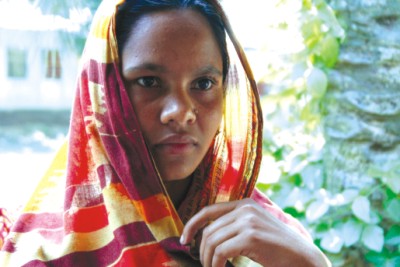|
straight Talk
Silent Voices
NADIA KABIR BARB
 |
Photo: Zhedul i khan |
Being a woman is not always easy. We are somehow bound by some social or cultural norms or religious constraints. Strangely this does not generally seem to apply to men. We talk about empowerment and emancipation of women but sadly in many cases in Bangladesh and many parts of the world, this remains an idealistic concept rather than a reality. Before some of my male readers refuse to read on thinking that this is an article solely based on male bashing, let me reassure you that this is nothing of the kind. My recent trip to Dhaka gave me an opportunity to meet some women whose stories I found not only deeply poignant but also quite distressing.
A month ago Rokeya Begum was eagerly anticipating the birth of her grandchild. Her daughter Selina was in her final trimester of her pregnancy and living with her in-laws. A couple of weeks before the baby's due date, Rokeya went to be with her daughter. A few days after her mother's arrival, Selina slipped in the bathroom and fell on her stomach. When Selina told her in-laws, they did not think it necessary to take her to the doctor. Despite Rokeya trying to urge them to have her seen by a professional they refused and brought in a local midwife who examined Selina and claimed that there was nothing amiss. However, when Selina went into labour and gave birth, it was to a stillborn baby.
When I asked Rokeya why she had not taken her daughter herself, she said that she wished she had but at the time did not want to create any trouble between Selina and her in-laws by trying to insist on calling a doctor. Life can deal people a bad hand but this was a tragedy that was in all likelihood unavoidable. I watched Rokeya and noticed that for most of the time she barely spoke or smiled. I can only imagine what her daughter must be going through. But both women are helpless and have no recourse but to bear this. If this was not bad enough, Rokeya went on to tell me that her elder daughter was now suffering hardship as her husband had left her and married another woman after -5- years of marriage.
Talking about her elder daughter's plight, Rokeya commented that the people who should also be punished are those who perform the marriage ceremonies for men who are already married. Unsurprisingly, they too are men.
 Another case was where I spoke with Amina who lives in a village in Mymensingh. She is a tiny little woman whose physical appearance and demeanour makes people think she is far older than her actual age. She disclosed that her major worry for the past few years had been that her youngest daughter was still not married and her desire was to see her settled. She told me with a hint of sadness that due to the fact that her daughter Atiya was dark and not very attractive, there were never any offers of marriage for her. To add to this she said that Atiya was also asthmatic and suffered from chronic headaches. This did not make her a very desirable prospective daughter- in-law or wife. Amina explained that what concerned her was what would happen to Atiya if and when she passed away. Who would look after her? But this all changed when a proposal for Atiya finally came and Amina and her family jumped at the offer. The groom worked in Chittagong and would take Atiya with him after the wedding-what could be better. Another case was where I spoke with Amina who lives in a village in Mymensingh. She is a tiny little woman whose physical appearance and demeanour makes people think she is far older than her actual age. She disclosed that her major worry for the past few years had been that her youngest daughter was still not married and her desire was to see her settled. She told me with a hint of sadness that due to the fact that her daughter Atiya was dark and not very attractive, there were never any offers of marriage for her. To add to this she said that Atiya was also asthmatic and suffered from chronic headaches. This did not make her a very desirable prospective daughter- in-law or wife. Amina explained that what concerned her was what would happen to Atiya if and when she passed away. Who would look after her? But this all changed when a proposal for Atiya finally came and Amina and her family jumped at the offer. The groom worked in Chittagong and would take Atiya with him after the wedding-what could be better.
What she then told me was the bridegroom's family had asked for a few things. “Lots of people ask for a lump sum of money but they just wanted a steel 'almari', a bed, a gold ring, a nice pair of trousers and shirt for the groom...” This piece of information set off warning bells in my head. Her expression told me I was right. Soon after the wedding, they started pressurising her for the promised items. When Atiya's family asked when Atiya would be going to Chittagong the response was completely contradictory to the one they had given to Amina and told her that Atiya would be staying with his family in the village so she could help look after them.
Amina feels that she has fallen out of one problem straight into another. The only difference is that now she is unable to look after her daughter. I asked her why she had been so desperate to marry Atiya off in the first place and she explained that living in a village meant that people had started to talk about why Atiya was still not married at the age of 25. They began circulating rumours about her, implying that she must be of a loose moral character. All she feels she can do now is wait and pray that her daughter is not abused in her new home.
Both Rokeya and Amina's stories are similar to thousands of women in our country. They do not want to resort to legal action as they do not have the means and more importantly do not want to create any additional strife for their daughters, their families or themselves.
I find myself immensely fortunate to have freedom and independence of thought and action, something many women do not have the luxury of. I could just as easily have been in Atiya's predicament with my asthma and chronic headaches if I had not been born into the family I have been. Or I might have not made it through the first hour of my birth if I had been born into a family where newborn girl babies are buried alive or drowned. I could just as easily have been forced into a marriage against my will or beaten by my husband and in-laws for not bringing a dowry. To some extent we are all bound by certain rules that society imposes on us but it is always the woman who bears the brunt of this imposition.
Copyright
(R) thedailystar.net 2010 |
